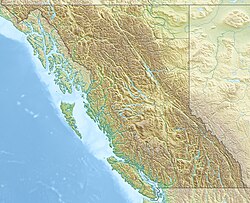| Younghusband Ridge | |
|---|---|
| Highest point | |
| Elevation | 3,170 m (10,400 ft) [1] [a] |
| Prominence | 130 m (430 ft) [1] |
| Parent peak | Apex Mountain (3250 m) [1] |
| Listing | |
| Coordinates | 52°14′09″N117°48′54″W / 52.2358334°N 117.815°W [4] |
| Geography | |
| Country | Canada |
| Provinces | Alberta and British Columbia |
| District | Kootenay [5] |
| Protected area | Jasper National Park [6] |
| Parent range | Park Ranges |
| Topo map | NTS 83C4 Clemenceau Icefield [4] |
| Climbing | |
| First ascent | July 28, 1927 by Alfred J. Ostheimer, guided by Hans Fuhrer [1] [2] |
Younghusband Ridge is located east of Wood Arm Kinbasket Lake and straddles the Continental Divide marking the Alberta-British Columbia border. [5] It was named in 1927 by Alfred J. Ostheimer after Lt. Col. Sir Francis Younghusband. [2] [1]


